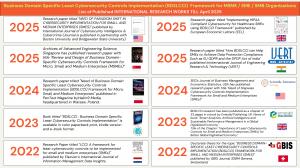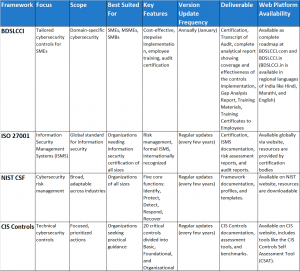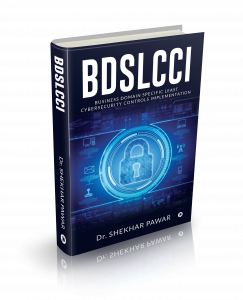BDSLCCI Framework strengthens Small & Medium Enterprises with Enhanced Cybersecurity & Compliance: SME Research Insights
Foundational Research and Practical Implementation of the BDSLCCI Cybersecurity Framework to Strengthen Security and Compliance for Small and Medium Enterprises
SMEs are celebrated for their agility and innovation. These characteristics enable them to lead advancements in niche markets while responding swiftly to changing consumer demands. Additionally, SMEs play a crucial role in global trade by leveraging digital platforms to access international markets. Their contributions extend further to fostering local economic resilience, promoting sustainability, and aiding in recovery during periods of crisis.
However, with the increasing reliance on digital tools, SMEs face growing cybersecurity challenges. The Verizon 2025 Data Breach Investigations Report highlights alarming trends specific to this group. The report reveals that 97% of data breaches in the Asia-Pacific region are driven by system intrusion, social engineering tactics, and web application attacks. Notably, SMBs were disproportionately affected by ransomware, which was present in 88% of breaches targeting smaller organizations, compared to just 39% among larger companies. These findings underscore the pressing need for SMBs to implement proactive cybersecurity measures to mitigate risks and safeguard their operations.
# Challenges Faced by SMEs in Cybersecurity:-
According to the Business Domain Specific Least Cybersecurity Controls Implementation (BDSLCCI) framework, SMEs face unique and multifaceted challenges in maintaining effective cybersecurity:
1. High Implementation Costs: Many existing cybersecurity standards demand extensive controls, which are often prohibitively expensive and resource-intensive for SMEs.
2. Limited Resources: SMEs frequently operate with constrained financial, technical, and human resources, making it difficult to implement robust cybersecurity strategies.
3. Generic Frameworks: Generic cybersecurity frameworks fail to address the specific needs of SMEs, leading to inefficiencies and gaps in protection.
4. Expanded Attack Surface: The increased adoption of digital tools has expanded the attack surface, leaving SMEs vulnerable to threats such as ransomware, phishing, and insider attacks.
5. Lack of Awareness: Both employees and management often lack the necessary cybersecurity awareness, increasing susceptibility to human error and insider threats.
6. Compliance Hurdles: Complying with global regulations like the General Data Protection Regulation (GDPR) and India's Digital Personal Data Protection (DPDP) Act can be overwhelming without tailored guidance.
7. Insufficient ROI Visibility: SMEs struggle to assess the return on investment (ROI) for cybersecurity measures, discouraging them from adopting adequate controls.
8. Evolving Threat Landscape: Cyber threats are continuously evolving, making it challenging for SMEs to keep up with the latest security practices and tools.
# The Role of the BDSLCCI Framework:-
The BDSLCCI framework addresses these challenges by providing cost-effective, domain-specific, and stepwise cybersecurity solutions tailored to the unique needs of SMEs. Here are its key features:
1. Tailored Cybersecurity Controls: Unlike generic frameworks, BDSLCCI offers customized controls specific to each business domain. This ensures SMEs focus on implementing relevant measures, reducing unnecessary expenses.
2. Cost-Effective Solutions: The framework significantly reduces implementation costs—up to five times less than traditional standards. It also offers free tools such as vulnerability scanners and cybersecurity awareness materials.
3. Stepwise Implementation: BDSLCCI prioritizes controls in a logical sequence, allowing SMEs to gradually enhance their cybersecurity without overburdening their resources.
4. Employee Training and Awareness: The framework includes online training modules, posters, and daily threat alerts to foster awareness and vigilance among employees.
5. Audit and Certification: SMEs can achieve BDSLCCI certification through audits, demonstrating their commitment to cybersecurity and enhancing their reputation.
6. Proactive Defense Mechanisms: The framework emphasizes robust defenses against ransomware, malware, and other evolving threats that disproportionately target SMEs.
# Key Research on the BDSLCCI Framework:-
Since its inception in 2022, the BDSLCCI framework has been the focus of extensive research. Below are notable published works:
1. "Need of Paradigm Shift in Cybersecurity Implementation for SMEs"
Published in the "International Journal of Cybersecurity Intelligence & Cybercrime" (in partnership with Boston University and Bridgewater State University, USA).
Research Link: https://vc.bridgew.edu/ijcic/vol8/iss1/4/
2. "Review and Design of Business Domain Specific Cybersecurity Controls Framework for MSMEs"
Published in the "Archives of Advanced Engineering Science" by Bon View Publishing, Singapore.
Research Link: https://ojs.bonviewpress.com/index.php/AAES/article/view/4438
3. "LCCI: A Framework for Least Cybersecurity Controls to be Implemented for SMEs"
Published in Elsevier's "International Journal of Information Management Data Insights".
Research Link: https://www.sciencedirect.com/science/article/pii/S2667096822000234
4. "Implementing HIPAA Compliant Cybersecurity for Healthcare SMEs using BDSLCCI Framework"
Published in the "European Economic Letters".
Research Link: https://www.eelet.org.uk/index.php/journal/article/view/2904
5. "Need of Stepwise Cybersecurity Controls Implementation Framework for SMEs"
Published in the "Journal of Business Management and Economics Statistics" by the Scientific Eminence Group, USA.
Research Link: https://scientificeminencegroup.com/articles/JBME/Need-of-Stepwise-Cybersecurity-Controls-Implementation-Framework.pdf
6. "Importance of Least Cybersecurity Controls for SMEs in a Global Digitalised Economy"
Featured in the book "Smart Analytics, Artificial Intelligence, and Sustainable Performance Management".
Book Link: https://bookstore.emerald.com/smart-analytics-artificial-intelligence-and-sustainable-performance-management-in-a-global-digitalised-economy-hb-9781837534173.html
7. "BDSLCCI Framework for SMEs"
Published in the "GBIS Journal", SSBM Geneva, Switzerland.
Research Link: https://www.gbis.ch/index.php/gbis/article/view/102
8. "How BDSLCCI Can Help SMEs Achieve GDPR and DPDP Act Compliance"
Published in the "International Journal of Engineering Research & Technology (IJERT)".
Research Link: https://www.ijert.org/how-bdslcci-can-help-smes-to-achieve-data-protection-compliance-such-as-eu-gdpr-and-the-dpdp-act-of-india/
9. Book: "BDSLCCI: Business Domain Specific Least Cybersecurity Controls Implementation"
Details Dr. Pawar’s research on BDSLCCI and its practical application for SMEs.
Book Link: https://www.amazon.com/BDSLCCI-Business-Specific-Cybersecurity-Implementation/dp/B0CCZCWPFW
10. "Need of BDSLCCI Framework for SMEs"
Published in "PenTest Magazine", Hakin9 Media, Warsaw, Poland.
Research Link: https://pentestmag.com/need-of-business-domain-specific-least-cybersecurity-controls-implementation-bdslcci-framework-for-micro-small-and-medium-enterprises/
# Conclusion:-
The BDSLCCI framework has proven its effectiveness in mitigating cybersecurity challenges specific to SMEs including hospitals and institutes. Its implementation across sectors such as manufacturing, healthcare, and retail highlights its adaptability and relevance. For global SMEs, the framework is available via https://www.BDSLCCI.com (available in English language), and for India's MSMEs, through https://www.BDSLCCI.in (available in English, Hindi, Marathi languages, more integrations are in progress). SecureClaw Incorporation (USA) and SecureClaw IT and Cybersecuirty (India) welcomes SMEs, MSMEs, and SMBs worldwide to adopt the BDSLCCI framework and fortify their cybersecurity posture.
Shekhar Pawar
SecureClaw Inc.
+1 218-718-2121
customercare@secureclaw.com
Visit us on social media:
LinkedIn
Instagram
Facebook
YouTube
X
Other
Legal Disclaimer:
EIN Presswire provides this news content "as is" without warranty of any kind. We do not accept any responsibility or liability for the accuracy, content, images, videos, licenses, completeness, legality, or reliability of the information contained in this article. If you have any complaints or copyright issues related to this article, kindly contact the author above.
Polyethylene Terephthalate Glycol (PETG) Market Insights – Applications, Pricing & Forecast 2025 | DataM Intelligence
Age‑Related Macular Degeneration Market Size, Epidemiology, Drugs, Pipeline Therapies, and Regional Outlook 2025-2035
PowerPatent Unveils Innovative AI-Driven Solutions for University Technology Transfer Office Patent Portfolio Management
Więcej ważnych informacji
 Jedynka Newserii
Jedynka Newserii

 Jedynka Newserii
Jedynka Newserii

Handel

Komisja Europejska chce wprowadzić ujednolicone przepisy dotyczące wyrobów tytoniowych. Europosłowie mówią o kolejnej nadregulacji
Ministerstwo Zdrowia opracowało nowy projekt przepisów wprowadzających kolejne zakazy dotyczące wyrobów tytoniowych – całkowitą eliminację e-papierosów oraz zakaz aromatów w woreczkach nikotynowych. Najprawdopodobniej w ciągu kolejnych dwóch–trzech lat Polska będzie musiała implementować nową dyrektywę dotyczącą wszystkich produktów tytoniowych, nad którym niebawem ma rozpocząć prace Komisja Europejska. Europosłowie mówią o ryzyku chaosu legislacyjnego, nadregulacji i wskazują na zagrożenia związane z proponowaną podwyżką akcyzy.
Konsument
Za trzy miesiące ruszy w Polsce system kaucyjny. Wątpliwości budzą kwestie rozliczeń i podatków

Zaledwie trzy miesiące zostały do startu systemu kaucyjnego w Polsce. Kaucje obejmą szklane i plastikowe butelki oraz puszki z napojami. To duża zmiana dla producentów napojów, sklepów i konsumentów oraz pośredniczących w zbiórce operatorów systemów kaucyjnego. Na razie przepisy są na tyle niedoprecyzowane, że budzą wiele wątpliwości w kwestii rozliczania podatków czy rozliczeń z operatorami. Producenci będą musieli płacić podatek od niezwróconych butelek, co zwiększy ich koszty.
Transport
Rośnie skala agresji na polskich drogach. Problemem jest nie tylko nadmierna prędkość, ale też jazda na zderzaku

Za kilka dni zaczynają się wakacje, czyli statystycznie najniebezpieczniejszy czas na drogach. Wśród głównych przyczyn takich zdarzeń na prostych odcinkach drogi są nadmierna prędkość i jazda na zderzaku. Zarządca autostrady A4 Katowice–Kraków w ramach kampanii „Nie zderzakuj. Posłuchaj. Jedź bezpiecznie” zwraca uwagę na zjawisko agresji na polskich drogach i przypomina, że bezpieczeństwo zaczyna się od osobistych decyzji kierowcy.
Partner serwisu
Szkolenia

Akademia Newserii
Akademia Newserii to projekt, w ramach którego najlepsi polscy dziennikarze biznesowi, giełdowi oraz lifestylowi, a także szkoleniowcy z wieloletnim doświadczeniem dzielą się swoją wiedzą nt. pracy z mediami.












.gif)

 |
| |
| |
|